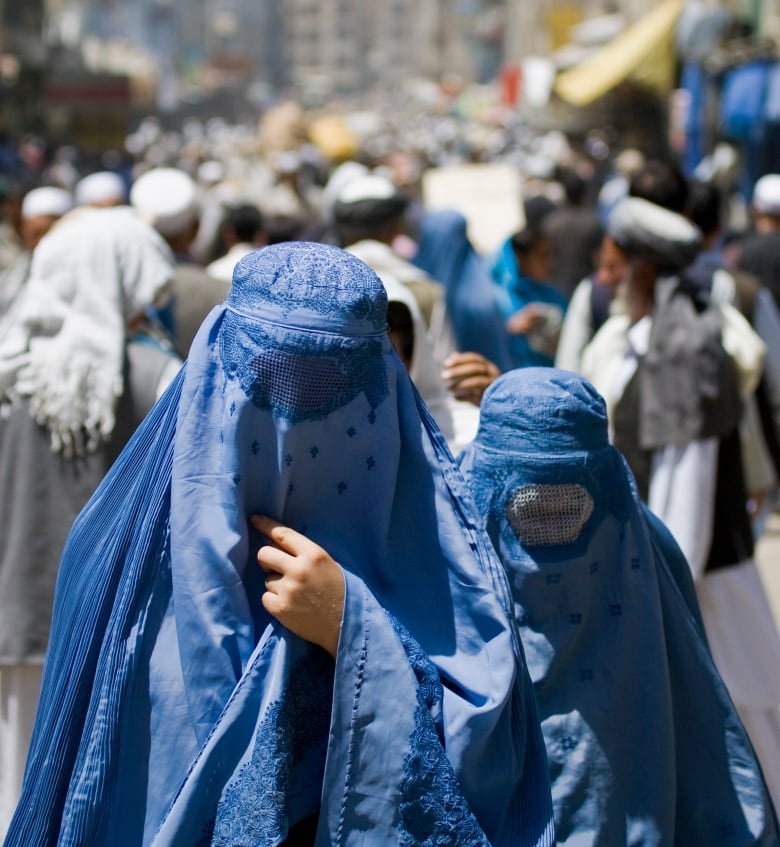Afghanistan's Taliban order women to wear burka in public
Wearing of all-covering robe also enforced during Taliban's previous hardline rule
Afghanistan's Taliban rulers on Saturday ordered all Afghan women to wear the all-covering burka in public, a sharp hardline pivot that confirmed the worst fears of rights activists and was bound to further complicate Taliban dealings with an already distrustful international community.
The decree says that women should leave the home only when necessary, and that male relatives would face punishment starting with a summons and escalating up to court hearings and jail time for women's dress code violations.
It was the latest in a series of repressive edicts issued by the Taliban leadership, not all of which have been implemented. Recently,for example, the Taliban forbade women to travel alone, but after a day of opposition, that has since been silently ignored.
On Sunday in the capital, Kabul, many women on the street were wearing the same large shawls as before. Women also arrived unaccompanied at Kabul International Airport, while in the city women boarded small buses alone.
The United Nations Assistance Mission in Afghanistan said it was deeply concerned with what appeared to be a formal directive that would be implemented and enforced, adding that it would seek clarifications from the Taliban about the decision.
"This decision contradicts numerous assurances regarding respect for and protection of all Afghans' human rights, including those of women and girls, that had been provided to the international community by Taliban representatives during discussions and negotiations over the past decade," it said in a statement.
Parallels to past Taliban rule
The decree, which calls for women to show only their eyes and recommends they wear the head-to-toe burka, evoked similar restrictions on women during the Taliban's previous rule between 1996 and 2001.
"We want our sisters to live with dignity and safety," said Khalid Hanafi, acting minister for the Taliban's Ministry for the Propagation of Virtue and the Prevention of Vice.

The Taliban previously decided against reopening schools to girls above Grade 6, reneging on an earlier promise and opting to appease theirbase at the expense of further alienating the international community.But this decree does not have widespread support among a leadership that's divided between pragmatists and hardliners.
That decision disrupted efforts by the Taliban to win recognition from potential international donors at a time when the country is mired in a worsening humanitarian crisis.
"For all dignified Afghan women, wearing hajib is necessary and the best hajib is chadori[the head-to-toe burka],which is part of our tradition and is respectful," Shir Mohammad, an official from the virtue and vice ministry, said in a statement.
The decree added that if women had no important work outside, it is better for them to stay at home. "Islamic principles and Islamic ideology are more important to us than anything else," Hanafi said.
Senior Afghanistan researcher Heather Barr of Human Rights Watch urged the international community to put co-ordinated pressure on the Taliban.
"[It is]far past time for a serious and strategic response to the Taliban's escalating assault on women's rights," she wrote on Twitter.
Canada is deeply concerned by escalating restrictions on Afghan women by the Taliban, now including the ruling to wear the all-covering burka in public. The #humanrights gains for women & girls in Afghanistan achieved in recent decades must be preserved.
—@CanadaFPThe Taliban were ousted in 2001 by a U.S.-led coalition for harbouring al-Qaeda leader Osama bin Laden, but they returned to power after the chaotic departure by the U.S. last year. The White House did not have immediate comment on the Taliban's latest decree.
Since taking power last August, the Taliban leadership has been squabbling among themselves as they struggle to transition from war to governing. It has pittedhardliners against the more pragmatic among them.
A spokesperson from Pangea, an Italian non-governmental organization that has assisted women for years in Afghanistan, said the new decree would be particularly difficult for them to swallow since they had lived in relative freedom until the Taliban takeover.

"In the last 20 years, they have had the awareness of human rights, and in the span of a few months have lost them," Silvia Redigolo said by telephone. "It's dramatic to [now]have a life that doesn't exist."
Infuriating many Afghans is the knowledge that many of the Taliban'syounger generation, like Sirajuddin Haqqani, are educating their daughtersin Pakistan, while women and girls in Afghanistan have been targeted by their repressive edicts since taking power.Haqqani is a UN-designated terrorist and head of the Haqqani network, which has been blamed for some of the deadliest attacks during the 20-year U.S.-led invasion.













_(720p).jpg)


 OFFICIAL HD MUSIC VIDEO.jpg)
.jpg)



























































































